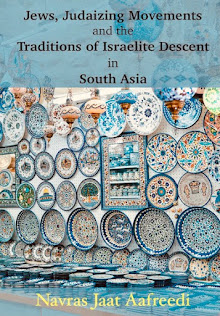Perhaps
no scholar has worked harder in recent years to understand and publicize the
overlapping of Indianness and Jewishness in general, and Jewishness and Indian
Muslimness in particular, than Navras Jaat Aafreedi. Aafreedi’s efforts have
included organizing readings of the work of many of the writers featured in
Chapter 4, advocating the establishment of Jewish Studies as an academic
discipline in India, promoting Holocaust awareness, and developing both in
person and online forums intended to foster contemporary Muslim-Jewish
solidarity and friendship, among many other activities. He has proven to be a
controversial figure and has been accused, quite outrageously , of being a
radical Zionist and/or a Mossad agent; he sees himself as a “secular humanist”.
His work, and its success, offers hope that the cosmopolitanism so wistfully
lauded by many of the texts analyzed in this monograph need not be regarded as a
thing of the past. But the misunderstanding, and even hostility toward,
Aafreedi’s work, is evidence that optimism for a syncretic future must remain
guarded.
…While
the other issues Aafreedi has championed – Holocaust education, celebrating
Jewish cultural contribution to India, recognizing shared Muslim and Jewish
history – may be underappreciated in India and elsewhere, they are not, as this
book has made clear, entirely unknown or novel and have been embraced, to
varying degrees, by other Indian writers and scholars.
-
Anna Guttman, Writing Indians and
Jews: Metaphorics of Jewishness in South Asian Literature, Palgrave
Macmillan, New York, 2013, pp. 169-170







.jpg)


















No comments:
Post a Comment